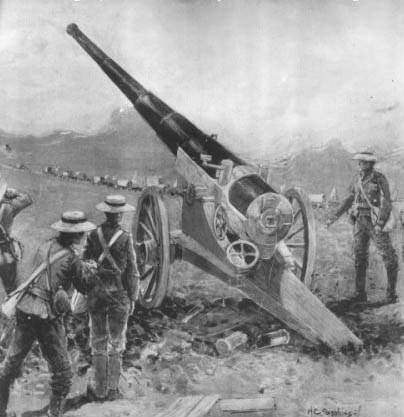
Navy Brigade at Ladysmith ILN 1899.
The Boer War marked the first time that Britain utilized citizen-soldiers to support its regular forces in combat.[1] It has been argued that this led to an increased sense of pride both on national and local levels.[2] This article seeks to explore the often overlooked involvement of the Naval Brigades, who played a vital supporting role in the conflict, and how their exploits were celebrated by the local community of Portsmouth and reported in the local press.
Like many seamen, men who served in the Naval Brigades were often tied to port towns by family connections.[3] Therefore it follows that there were strong links between people of the town and those in the brigades: friends, brothers and sons. They were a popular subject for the Hampshire Telegraph who reported avidly on the victories and defeats of the Naval Brigades at the Cape. Hyperbole is evident but reports are supplemented by accounts from bluejackets and marines which give a more realistic idea of the horrors of war.[4]
When these men returned to Portsmouth they were given organized welcoming ceremonies on a grand scale which clearly demonstrated both national and local pride. For example, when HMS Powerful and her Naval Brigade detachment returned from South Africa the ships in Portsmouth harbour were dressed, large crowds turned out to see them process through the town and they were treated to a banquet at the Town Hall.[5] The whole event was described as ‘a downright hearty English greeting’.[6] This is highlighted elsewhere when the Hampshire Telegraph commented upon the days excursions offered by rail companies to enable the public to welcome home the returning men and draws a direct comparison to the popularity of Fleet Reviews: ‘the spectacle of the Naval Brigade… will be worth coming many miles to see.’[7]
However, the Hampshire Telegraph also revealed that popular support could be lacking without clearly organized public events. In particular it reveals a case where a draft of sailors was leaving for the Cape via a small steamer and received cheers from only ‘one or two dockyardmen’.[8]
Therefore, it can be argued that Naval Brigades were seen as a distinct body of men who could be held out to encourage both national and local pride. As with other port towns they had links to the local community and when their exploits were being celebrated many from the town may have felt a keen interest in events. However, it is also evident that official events, carefully organized and orchestrated, were sites of greater expressions of celebration than smaller events. This topic deserves far greater consideration in order to analyse the material extant and provide a detailed view on expressions of popular support in port towns.
References
[1] Brad Beaven, ‘The Provincial Press, Civic Ceremony and the Citizen-Soldier During the Boer War, 1899-1902: A Study of Local Patriotism’, Journal of Imperial and Commonwealth History, 37, 2, 2009; 207-228, 208.
[2] Helen B. McCartney, Citizen Soldiers: the Liverpool Territorials in the First World War, (Cambridge: Cambridge University Press, 2005); 57.
[3] Mary A. Conley, From Jack Tar to Union Jack: representing naval manhood in the British Empire, 1870-1918, (Manchester: Manchester University Press, 2009); 43.
[4] Hampshire Telegraph, 30 December 1899: this edition reprinted a letter from a marine at the front detailing the terrible losses they suffered in one battle.
[5] Hampshire Telegraph, 25 April 1900.
[6] Hampshire Telegraph, 14 April 1900.
[7] Hampshire Telegraph, 24 March 1900.
[8] Hampshire Telegraph, 4 November 1899.










Comments are closed.